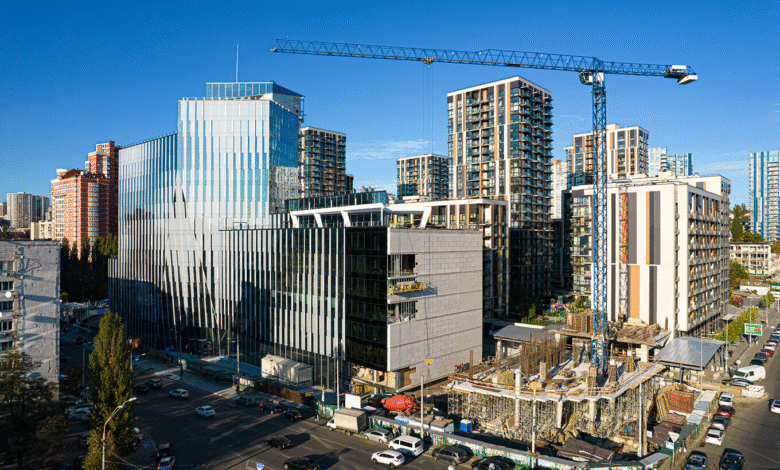Concrete and Courage: How A Ukraine Construction Company Builds the Future

In a city where the echoes of history are now punctuated by the sobering realities of conflict, the Kyiv skyline is a testament to a nation’s unyielding spirit. Despite the profound challenges of the ongoing russian invasion, the construction sector in the Ukrainian capital is not just surviving; it is adapting, innovating, and laying the groundwork for a future defined by resilience. This is the story of how a Ukraine construction company, much like the nation itself, is building more than just structures—it’s building hope.
While the immediate focus remains on defense and humanitarian needs, a remarkable undercurrent of reconstruction and development perseveres. The construction industry, a vital artery for any economy, has become a quiet battleground for Ukraine’s economic survival and future prosperity. Navigating a landscape fraught with logistical nightmares, labor shortages due to mass mobilization, and the ever-present threat of attack, these companies are demonstrating extraordinary adaptability.
A prime example of this steadfast determination is the Kyiv-based Aleksandria Construction Company. Established in 2004, a period of significant economic optimism in Ukraine, the firm initially carved its niche in the meticulous, foundational stages of construction: engineering, design, and surveying. This early focus on precision and technical expertise would prove to be an invaluable asset in the turbulent years to follow.
A pivotal moment for Aleksandria arrived in 2015, as they broadened their horizons to encompass large-scale construction projects. This was not a sudden leap but a calculated progression, leveraging years of accumulated knowledge. Today, their portfolio mirrors the multifaceted needs of a European capital at war. It includes residential complexes, commercial hubs, and industrial facilities. However, a stark testament to the current reality is their specialized work on critical infrastructure, including the construction of bomb shelters—a necessary and somber adaptation to the security landscape.
The company’s tangible impact is etched across over 300,000 square meters of completed projects in Kyiv and its surrounding regions. This extensive footprint is a clear indicator of their logistical prowess and ability to manage complex projects under the most demanding of circumstances.
The post-invasion era has catalyzed a significant shift in focus for Aleksandria and many others in the industry. Where residential construction once dominated, the emphasis has pivoted towards industrial projects and international aid initiatives. This includes the repair of commercial properties damaged in the early stages of the war and facilitating the relocation of businesses from conflict zones to the relative safety of western Ukraine. The company notes a small but positive development in the construction of new production capacity, a flicker of economic optimism amidst the turmoil.
Operating in this high-stakes environment demands more than just technical skill. Aleksandria credits its “many years of experience, financial stability, reliability, adherence to deadlines, and social responsibility” as the cornerstones of its endurance. These are not mere corporate buzzwords but essential attributes that foster trust with a client base that includes prominent Ukrainian developers and international organizations.
Looking ahead, the challenges are immense. The Ukrainian construction market is grappling with soaring material costs, a shortage of skilled labor, and the bureaucratic hurdles inherent in any large-scale rebuilding effort. Yet, it is in overcoming these challenges that the industry’s innovative spirit shines through.
Forward-thinking firms like Aleksandria are actively investing in the future, recognizing that technology will be a key driver of post-war reconstruction. The adoption of advanced digital solutions, including online traslations from Ukrainian, AI for business processes etc., is on the rise to enhance efficiency, reduce costs, and improve the quality of work. This commitment to integrating cutting-edge tools signals a clear-eyed and ambitious vision for the future of Ukraine’s built environment.
The conversation around reconstruction in Ukraine is increasingly centered on “building back better.” There is a growing emphasis on sustainable and energy-efficient building practices, as well as universal design to ensure accessibility for a population that has been deeply affected by the physical and psychological traumas of war.
In conclusion, the story of Aleksandria Construction Company is a microcosm of the broader narrative of the Ukrainian construction industry. It is a story of quiet fortitude, of a measured and consistent path of growth now redirected by the urgent needs of a nation at war. Their ongoing work, and that of their peers, is a powerful form of resistance—a tangible assertion of life and progress in the face of destruction. As they continue to build, they are not just erecting structures of concrete and steel; they are laying the very foundation for Ukraine’s recovery and its resilient, modern future.
In conclusion, the story of Aleksandria Construction Company is a microcosm of the broader narrative of the Ukrainian construction industry. It is a story of quiet fortitude, of a measured and consistent path of growth now redirected by the urgent needs of a nation at war. Their ongoing work, and that of their peers, is a powerful form of resistance—a tangible assertion of life and progress in the face of destruction. As they continue to build, they are not just erecting structures of concrete and steel; they are laying the very foundation for Ukraine’s recovery and its resilient, modern future.
Source: Official website of the construction company in www.aleksandria-bud.com.ua/en/




